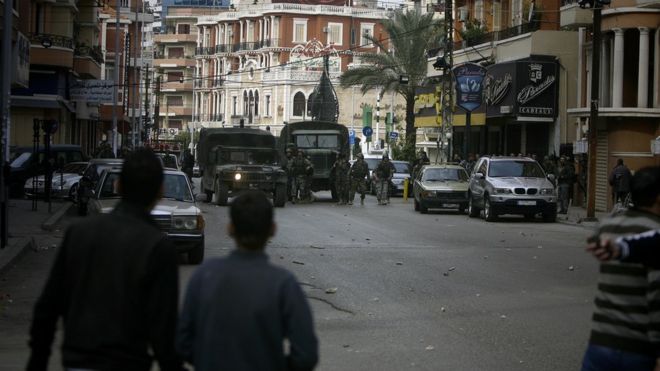A mother-of-three, Um Omar is in her mid-40s but the wrinkles and sad look on her face make her seem like a much older, tired woman. She wants to tell the story of her son but is fearful of retaliation by the Lebanese military establishment in case she is discovered. Her name has been changed to protect her identity.
Um Omar's son was detained and tortured for three years, and then released at the age of 24 with no charges against him. She shares a grievance with many Sunni Muslims in the Middle East these days, not only in Lebanon.
"We are victims in the war against terror," Um Omar says, adding that in her view Lebanese Sunnis have no leader to protect them.
"We are oppressed - the Sunni leaders are only focused on their interests and political gains, and they don't protect us. [Hezbollah leader Sheikh Hassan] Nasrallah protects the Shia Muslims. Walid Jumblatt protects his people - the Druze - and our leaders only call for tolerance while we face a constant crackdown by the government," she protests, accusing the military and state security apparatus.
Um Omar says many young men, like her son, who are held in the infamous Roumieh high-security prison in Lebanon, are at risk of getting radicalised because of their harsh treatment in detention.
"These practices are pushing young people to extremism. When we face such things we say it's better to have the Islamic State (IS) than the Lebanese state.
"Although we know if IS comes here we may be the first to be killed but at least we die once and for all, not a slow death like this."
Harsh treatment
Roumieh prison in Metn district, east of Beirut, is one of the most notorious prisons in Lebanon.
In 2015, videos were leaked on social media showing prison guards beating up prisoners. Many prisoners later rioted, calling for a change in conditions. The situation only got worse after the war in Lebanon's neighbour - Syria - started.
Tripoli is a predominantly Sunni city, where resentment and anger against the government is strong and where many locals say the authorities' attempts to fight terrorism seem counter-effective.
"Any person, anywhere who faces injustice will have a reaction - at least a psychological one - towards the oppressor," says Ahmad Statite, a former prisoner who spent a year-and-a-half without trial, accused of belonging to radical groups, but ultimately released without charge.
"In 2007, following tensions in the Palestinian Nahr al-Bared refugee camp in Lebanon, 50 people were detained and tortured and accused of terrorist acts but then released with no charges. One of them joined the Islamic State," he said.
Ahmad is now working with a committee to support prisoners.
"A very limited number will have a violent reaction to facing such injustices, but we need the government to take the right steps to prevent such a reaction," he argues.
"Many Sunnis feel that they are targeted and that the government is treating them differently to Christians and Shia. Roumieh prison is full of Sunnis while, when it comes to the Shia of Hezbollah, no-one can touch them even if they commit crimes," he claims.
As Lebanese society split between supporters and opponents of Syrian President Bashar al-Assad, the Shia Islamist militant group Hezbollah started sending fighters to back President Assad's forces.
"Members of Hezbollah are treated as heroes when they get back to Lebanon, but it doesn't seem the same case for Sunnis who go to fight," Um Omar tells me.
"Our sons are arrested when they come back from Syria, Hezbollah's fighters are hailed as heroes."
'Huge problem'
There is a general sense among Sunnis that they are paying a high price in the war against terrorism and the rise of so-called Islamic State. Many feel they are being tarred with the same brush and punished for what a small group of extremists is doing.
Judge Mohamad Saeb, Senior Advisor to the Minister of Justice, acknowledged there is an issue with the way Sunnis are treated in Lebanon .
"Roumieh prison is a very huge problem for the Lebanese government. It's overcrowded; there are nearly 4,000 prisoners there while its capacity is only for 2,000.
"The Ministry of Justice is following this case and co-operating with the Ministry of Interior, but all these efforts are not enough to end the suffering of prisoners in Roumieh. With the cases of Islamists in the prison, where the majority are Sunnis, many of them feel they are treated unfairly - especially when some are left for two or three years in prison without a trial," he said.
Judge Saeb said things have improved in the prison but more needed to be done.
Tripoli's top Sunni cleric Mohammed al-Shaar has called on the government to enforce rule of law.
"I have no doubt that unfair treatment and investigations that violate the rule of law, especially for young men, have inflamed the situation," he said.
"Holding prisoners for years without trial is against human rights and it could create an atmosphere of heated reactions that would lead people to clash with the government."
The resentment within the Sunni community is widely felt in a country that is defined by sectarian divisions. With instability and war surrounding Lebanon, many here argue that in order to avoid escalating tensions, reforms need to be made, and soon.
